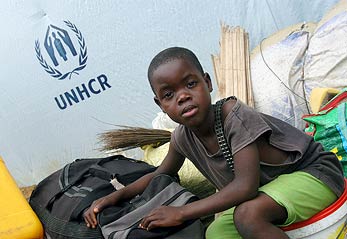Thousands of Liberians returning home on their own
Thousands of Liberians returning home on their own

MONROVIA, Liberia, Feb 26 (UNHCR) - The UN refugee agency is stepping up efforts to help thousands of Liberian refugees who have returned on their own in recent weeks, buoyed by hopes of peace as UN peacekeeping troops deploy to more areas in the strife-torn country.
On Thursday, UNHCR started daily transport from Liberia's Bo Waterside border with Sierra Leone to help move the new arrivals to Monrovia, where they can receive assistance. Prior to this, some of the returnees - who started arriving on their own in December - had been stuck at the border because they had no money to continue their journey to the capital or other home areas.
So far, UNHCR has registered 3,000 returnees in an ongoing exercise in Monrovia. The returnees are being housed in Perrytown on the city's outskirts. Some are living in a transit centre while UNHCR builds more shelters for them. Upon registration, they receive relief items and food from the World Food Programme.
"We are concerned about these spontaneous returnees because they are coming back to a state of continued displacement," said UNHCR's Representative in Liberia, Moses Okello. "While the return of Liberians to their country is a good sign of confidence in the peace process, they are doing so prematurely and are ending up in camps for the displaced."
He added, "The challenge remains to make the conditions in their places of origin conducive for the returnees and their internally displaced compatriots to return to their homes and resume normal and productive living. UNHCR will continue to support them to ensure that their return is in safety and dignity."
While security has generally improved with the expanded deployment of troops from the UN Mission in Liberia (UNMIL), some areas are still tense and prone to sporadic skirmishes. Still, UNHCR expects many more refugees to return on their own through the course of this year, and in the run-up to the presidential elections scheduled in late 2005.
Responding to these needs, the agency has been preparing to resume operations in counties outside Monrovia. It has set up mechanisms to monitor returnee movements, and is building shelters and identifying organisations to help on the ground. Once security constraints are lifted, UNHCR will then be able to provide returnees and displaced Liberians with the full assistance they need.
Currently, the agency is completing a transit centre for returnees in Gbarnga, central Liberia. It is also looking for more sites to build shelters in other counties.
Eventually, UNHCR plans to facilitate the return and reintegration of 320,000 Liberian refugees in the region, and 500,000 internally displaced persons (IDPs). Some 300,000 of the latter are now being assisted in IDP camps around the country.
As for the nearly 14,000 Sierra Leonean refugees still in Liberia, UNHCR recently launched a campaign to inform them of their options for return. So far, more than 50 refugees have registered for repatriation to Sierra Leone on overland convoys scheduled to start next week.








